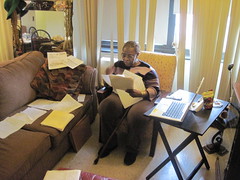Patricia James has been a resident of the Two Bridges public housing complex for more than half of her 67 years. About two years ago, mice began entering her apartment through holes underneath the radiators. The rodents, she said, were eating her food, nesting in her clothes and disrupting her family life. “At night my grandchildren can’t stay over,” she told The Local. “They get in the bed.” She said the New York City Housing Authority failed to fix the problem, so she stopped paying her $517-per-month rent.
In March of 2011, the Housing Authority deemed Ms. James chronically delinquent and began eviction proceedings. Between her back rent and other fees, she now owes more than $14,000.
After a month of negotiations between her lawyer and the city, the two parties have come to an agreement in principle, and Ms. James has readied a cashier’s check for $15,000. But she hasn’t yet turned it over. The Housing Authority, she said, has pledged to allow her to remain in her apartment so long as she pays the back rent, but it has refused to put it in writing — an odd tactic that her lawyer says he has never confronted in 35 years of practice.
“Usually two sides settle something, you put it in writing, everyone signs it and you walk away,” said attorney Kofi Scott. “She’s willing to pay but just wants some certainty in return.”
Ms. James worked in legal services herself before retiring two years ago. For 20 years, she was a paralegal assisting the union members of District Council 37. It was around the time of her retirement from helping others with their legal issues that her own problems began.
“I’ve had issues in the apartment with repairs,” she said at her home last week. “I have withheld my rent to get the repairs done.” As she spoke, Ms. James, who is afflicted with arthritis and carpal tunnel syndrome, moved around her apartment with the use of a cane, hunting for legal paperwork in stacks of documents. A state Supreme Court affidavit dated Aug. 12, 2011 explained why she stopped paying rent: “It is my understanding a tenant has the right to withhold the rent from a landlord when there are violations of the warranty of habitability,” she said in the affidavit. “That is what I did.”
Now, facing a final court hearing tomorrow regarding her eviction, she is wrestling with whether to take the Housing Authority lawyers at their word. “If it’s more or less business as usual, why won’t they put it in writing?” she asked.
Mr. Scott said that he was told by the Housing Authority’s lawyer that it is organizational policy not to sign off on any type of agreement prior to getting paid.
According to Mr. Scott, the Housing Authority has offered to drop the eviction case if Ms. James will agree to do a few things for them. First, the Housing Authority wants all back rent and other charges, paid off in full, immediately, a stipulation Ms. James has agreed to, hence the check. Second, Ms. James must agree to be placed on probation for two years and to have her rent automatically deducted from her bank account. Although they find the probation period a bit lengthy, Ms. James and Ms. Scott have also agreed to this.
But the closest thing that they’ve received to a written agreement is a blank boilerplate stipulation settlement that contained nothing specific to Ms. James’s case. She fears that once she hands over her check, the proposed agreement won’t be honored and she’ll be out of money and out on the street. She doesn’t want to leave the Lower East Side, where she has raised three children whose own children went to the same school she went to as a child. “It’s the only place I know as home. I have no idea what it’s like to live anywhere else,” she said.
Part of the reason she is so apprehensive is that she has had some conflicts with Housing Authority employees who work with residents of her building. Ms. James says that one of her neighbors was warned not to associate with her or else she would be sorry. The neighbor was unavailable for comment. “Apparently I’m a troublemaker,” Ms. James said.
The Housing Authority was asked to comment on the matter but declined because the case is still in litigation.
At least one person with knowledge of the situations believes she has cause for hope.
“They’re going to put it in writing,” said an attorney at a public firm who preferred to remain anonymous because she deals with the Housing Authority regularly. “If you’re in housing court, that’s what you do. It just doesn’t sound right. Having done this for 15 years, I’d say they’re going to put it in writing. New York City Housing Authority has to provide due process. There will be an agreement.”




